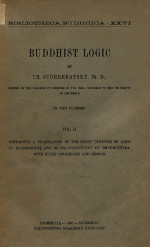|
|
| |

|

|
[Bibliotheca Buddhica XXVI:] Stcherbatsky Th. Buddhist logic. In two vols. Vol. 1. Leningrad: the USSR Academy of Sciences, 1932. XII, 560 p.; Vol. 2, containing a translation of the short treatise of logic by Dharmakirti, and of its commentary by Dharmottara, with notes appendices and indices. Leningrad: the USSR Academy of Sciences, 1930. VI, 469 p.
PREFACE
More than twenty years have elapsed since we have first treated the subject of Buddhist logic and epistemology as they were taught in the schools of Mahāyāna Buddhism. Our nearly unique source at that time was the Nyāya-bindu and ţīkā, this solitary Sanskrit remnant of what has been a vast field of literary production. Since that time our knowledge of the subject has been considerably enlarged. Important Sanskrit texts have been discovered and published in India. The interconnection and mutual influences of Indian systems are better known. The Tibetan literature reveals itself as an almost unlimited source of information. Prof. H. Jacobi has contributed a series of articles on the early history of Indian systems. Prof. J. Tucci has recently elucidated the problem of Buddhist logic before Dignāga. Prof. de la Vallee Poussin has brought to a successful end his monumental translation of the Abhidharma-Koša. Prof. Sylvain Lévi has enriched our knowledge by important discoveries in Nepal. Prof. M. Walleser has founded in Heidelberg an active society for the study of Mahāyāna. A great deal of work has been done by Indian and Japanese scholars. The Nyāya-bindu is no more a solitary rock in an unknown sea. Buddhist logic reveals itself as the culminating point of a long course of Indian philosophic history. Its birth, its growth and its decline run parallel with the birth, the growth and the decline of Indian civilization. The time has come to reconsider the subject of Buddhist logic in its historical connections. This is done in these two volumes of which the second appears before the first. It contains translations which aim at being intelligible, a reservation not unnecessary in Indian matters, since we have witnessed translations by authoritative pens which read like an absolutely unintelligible rigmarole. In the copious notes the literary renderings are given where needed. This will enable the reader fully to appreciate the sometimes enormous distance which lies between the words of the Sanskrit phrasing and their philosophic meaning rendered according to our habits of thought. The notes contain also a philosophic comment of the translated texts. The reader who would like to have a vue d'ensemble of Buddhist philosophy as it is represented in its logical part will have to go through the labyrinth of these notes and texts and make for himself a statement as well as an estimate of that doctrine. This task is facilitated in the first volume which will contain a historical sketch as well as a synthetical reconstruction of the whole edifice of the final shape of Buddhist philosophy, as far as it can be achieved at present. The second volume thus contains the material as well as the justification for this reconstruction. The first volume is in the press and we hope that it will appear before long.
 PDF-files PDF-files
The entire 1st volume
The entire 2nd volume
Keywords
Buddhist logic
Buddhist philosophy
Dharmakīrti
Dharmottara
Dignāga
Indian philosophy
|
|
|
|
Random news: Announcements |
|
The 4th International Academic Conference “The Written Heritage of the Orient” dedicated to the 220th anniversary of B.A. Dorn (1805–1881) will be held at the IOM RAS on April 14–16, 2025. |
|
Read more...
|
|
|
|
|

